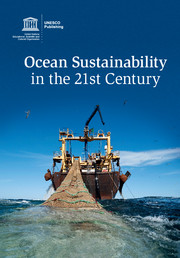Book contents
- Frontmatter
- Contents
- List of contributors
- Acronyms and abbreviations
- Foreword by Irina Bokova, Director-General of UNESCO
- Foreword by Thomas E. Lovejoy
- Preface
- Acknowledgements
- 1 Issues regarding oceans and opportunities: an introduction to the book
- 2 Main human uses of ocean areas and resources, impacts, and multiple scales of governance
- 3 Physical and chemical changes in the ocean over basin-wide zones and decadal or longer time-scales: perspectives on current and future conditions
- 4 Knowledge and implications of global change in the oceans for biology, ecology, and ecosystem services
- 5 A new perspective on changing Arctic marine ecosystems: panarchy adaptive cycles in pan-Arctic spatial and temporal scales
- 6 Ecosystem approach and ocean management
- 7 Challenges in using valuation in ecosystem-based management in a marine context: the case of UK Marine Protected Area designation
- 8 The contribution of international scientific cooperation and related institutions to effective governance for the oceans: the cases of regional tsunami early warning systems and the Argo project
- 9 Emerging and unresolved issues: the example of marine genetic resources of areas beyond national jurisdiction
- 10 The assumption that the United Nations Convention on the Law of the Sea is the legal framework for all activities taking place in the sea
- 11 The legal regime of outer space in light of the Law of the Sea
- 12 Towards sustainable oceans in the 21st century
- Index
- References
12 - Towards sustainable oceans in the 21st century
Published online by Cambridge University Press: 05 May 2015
- Frontmatter
- Contents
- List of contributors
- Acronyms and abbreviations
- Foreword by Irina Bokova, Director-General of UNESCO
- Foreword by Thomas E. Lovejoy
- Preface
- Acknowledgements
- 1 Issues regarding oceans and opportunities: an introduction to the book
- 2 Main human uses of ocean areas and resources, impacts, and multiple scales of governance
- 3 Physical and chemical changes in the ocean over basin-wide zones and decadal or longer time-scales: perspectives on current and future conditions
- 4 Knowledge and implications of global change in the oceans for biology, ecology, and ecosystem services
- 5 A new perspective on changing Arctic marine ecosystems: panarchy adaptive cycles in pan-Arctic spatial and temporal scales
- 6 Ecosystem approach and ocean management
- 7 Challenges in using valuation in ecosystem-based management in a marine context: the case of UK Marine Protected Area designation
- 8 The contribution of international scientific cooperation and related institutions to effective governance for the oceans: the cases of regional tsunami early warning systems and the Argo project
- 9 Emerging and unresolved issues: the example of marine genetic resources of areas beyond national jurisdiction
- 10 The assumption that the United Nations Convention on the Law of the Sea is the legal framework for all activities taking place in the sea
- 11 The legal regime of outer space in light of the Law of the Sea
- 12 Towards sustainable oceans in the 21st century
- Index
- References
Summary
12.1 Introduction
Problems faced by the oceans are interconnected. The state parties to the 1982 United Nations Convention on the Law of the Sea (UNCLOS) declared that they were ‘conscious that the problems of ocean space are closely interrelated and need to be considered as a whole’ (UNCLOS, 1982, Preamble). Therefore, we should tackle the problems of the oceans in an integrated manner. Opportunities offered by the oceans should equally be interconnected. State parties also recognized ‘the historic significance of this Convention as an important contribution to the maintenance of peace, justice and progress for all peoples of the world’ (UNCLOS, 1982, Preamble) and that the achievement of its goals would ‘contribute to the realization of a just and equitable international economic order which takes into account the interests and needs of mankind as a whole and, in particular, the special interests and needs of developing countries’ (UNCLOS, 1982, Preamble). Thus, we should bear in mind that efforts aimed at making a better use of the oceans in the broader framework of UNCLOS should be aimed ultimately at the maintenance of peace and sustainable development in an equitable manner for all humankind.
More than fifteen years after the entering into force of UNCLOS, it is legitimate to ask oneself whether the belief ‘that the codification and progressive development of the law of the sea achieved in this Convention’ (UNCLOS, 1982, Preamble) has indeed contributed ‘to the strengthening of peace, security, cooperation and friendly relations among all nations in conformity with the principles of justice and equal rights and will promote the economic and social advancement of all peoples of the world, in accordance with the Purposes and Principles of the United Nations as set forth in the Charter’ (UNCLOS, 1982, Preamble). Our preliminary assessment is: yes, but more could be done and better.
- Type
- Chapter
- Information
- Ocean Sustainability in the 21st Century , pp. 275 - 292Publisher: Cambridge University PressPrint publication year: 2015



